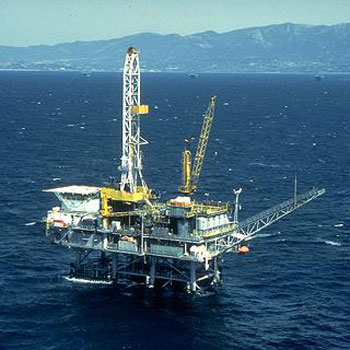 Yesterday’s Wall Street Journal had a maddening piece discussing the effect of the Obama administration’s shutdown of offshore oil drilling since the Deepwater Horizon accident in April last year, a piece which not only has pointed out the long-term implications of the moratorium and the subsequent “permitorium,” where official policy says drilling is allowed but the administration is doing everything it can to keep from issuing drilling permits, but also the terrible toll the policy has taken on Louisiana’s economy.
Yesterday’s Wall Street Journal had a maddening piece discussing the effect of the Obama administration’s shutdown of offshore oil drilling since the Deepwater Horizon accident in April last year, a piece which not only has pointed out the long-term implications of the moratorium and the subsequent “permitorium,” where official policy says drilling is allowed but the administration is doing everything it can to keep from issuing drilling permits, but also the terrible toll the policy has taken on Louisiana’s economy.
The impact of the delays goes beyond the oil industry. The Gulf coast economy has been hit hard by the slowdown in drilling activity, especially because the oil spill also hurt the region’s fishing and tourism industries. The Obama administration in September estimated that 8,000 to 12,000 workers could lose their jobs temporarily as a result of the moratorium; some independent estimates have been much higher.
The slowdown also has long-term implications for U.S. oil production. The Energy Information Administration, the research arm of the Department of Energy, last month predicted that domestic offshore oil production will fall 13% this year from 2010 due to the moratorium and the slow return to drilling; a year ago, the agency predicted offshore production would rise 6% in 2011. The difference: a loss of about 220,000 barrels of oil a day.
Drilling in waters of less than 500 feet also has been snared by the government’s increased scrutiny. Regulators requested modifications to 101 shallow-water drilling plans in 2010, compared with 59 such requests in 2009 and just 31 in 2008. Rig operators say drilling permits once approved in a matter of weeks have taken up to five months to process as the government introduced new rules.
The lengthy delays in reviewing new permits have caught the industry off guard. When the Obama administration lifted its ban on deep-water drilling on Oct. 12, many experts had expected a few permits to be issued before the end of 2010, followed by a gradual ramp-up of activity this year.
Among the new rules: Companies must hire outside engineers to certify key well-safety equipment and subject the gear to more rigorous tests. They require more worker training, more documentation and detailed plans of how they would respond to a worst-case well blowout.
The WSJ piece and the dawning of the 112th Congress tomorrow have engendered a fresh round of statements from Louisiana’s congressional delegation.
Sen. David Vitter launched first yesterday afternoon:
“The Obama administration’s ongoing refusal to allow any new deepwater oil drilling is infuriating. Ever since the moratorium was formally lifted, every effort to continue drilling, even in shallow water, has been tied up in endless amounts of bureaucratic red tape. Meanwhile, thousands of Louisianians continue to wonder when the administration will allow them to get back to work again,” added U.S. Sen. David Vitter.
Last month, Vitter placed a hold on the nomination of Dr. Scott Doney, who was nominated to be chief scientist at the National Oceanic and Atmospheric Administration. In a letter to President Obama, Vitter outlined his concerns about the administration’s lack of scientific integrity regarding the recent offshore drilling moratorium and the continuing de facto moratorium.
Then came Rep. Charles Boustany, who noted yesterday’s announcement by the administration that 13 producers who had ongoing drilling activity in the Gulf prior to Deepwater Horizon would be able to resume that activity according to new safety procedures without having to go through the rigamarole of an environmental impact study:
“I hope to continue to see more operators resume production in the Gulf as quickly as possible,” Boustany said. “As we see gas prices rise, America needs to increase its independence from foreign producers and utilize the resources we have. While this is a step in the right direction, I will continue to press this issue until better communication between the administration and producers is established, and energy production has returned to its normal levels. I called for working groups consisting of shallow and deep water operators and members of the Obama administration from both Washington and the Gulf Coast. I will continue to make these and other recommendations to Director Bromwich until this crisis is completely resolved.”
And new Rep. Jeff Landry also chimed in:
“This could be a step in the right direction, but we still have a marathon to go. The Obama Administration may reward some big companies in deepwater, but once again forgets about our independent, small business owners who explore the shelf.” said Landry. “Too little is not enough. And hopefully, too little is not too late.”
“The President and his Administration have once again ignored the thousands of people who rely on drilling the shelf. These guys have performed their jobs safely for decades and had nothing to do with the BP oil spill,” said Landry. “I will continue to fight for our hard-workers in South Louisiana so we can get them back to work.”
Whether the delegation can do much to rectify the Obama administration’s foot-dragging, or whether the country as a whole will have to wait for $150 a barrel oil and $5 a gallon gasoline before the current policy of strangling the oil and gas industry is abandoned is a good question.
Advertisement
Advertisement
